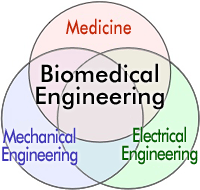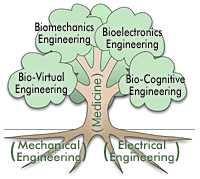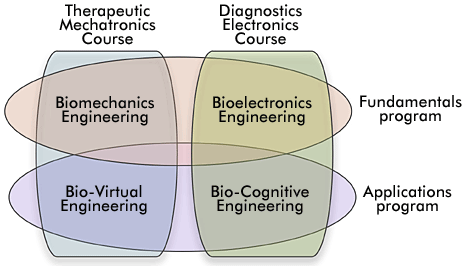Department Overview

medical engineering is an interdisciplinary field that conducts research and education concerned with a wide range of problems that are directly related to human beings and medicine using engineering methods. In this department, we study methods for solving these problems using technologies and knowledge from the electrical and mechanical engineering disciplines. Towards that end, in addition to engineering, we also study fundamental medical knowledge from areas such as physiology, internal medicine, and surgery, starting from the basics. With this knowledge and technology, we acquire basic skills that will be of use both for healthy people and for those who have some disease or medical condition. Concrete examples involving basic skills for solving problems faced by healthy people include biometric authentication, methods for preventing driving when drowsy, and health maintenance and improvement. Another area consists of skills related to technologies for clinical medicine and covers both skills related to diagnosis, clinical testing, and treatment and skills for developing home care technologies to support the elderly and disabled.
Program Overview

After entering the program, in the first years students study the basics of electrical engineering such as electronic circuit design in a program that includes hands-on experience. At the same time, they also study the basics of mechanical engineering, for example, creating home care robots, in a program that also includes hands-on experience. In the later years of the program, students select their desired specialty, either the Diagnostics Electronics Course (DEC) or Therapeutic Mechatronics Course (TMC), and carry out a graduation research project. In the Diagnostics Electronics Course, students study subjects such as electrophysiology, vision, and hearing, and in the Therapeutic Mechatronics Course, students study subjects such as motor physiology and intelligent robots. Furthermore, students acquire extensive knowledge that connects medicine and engineering without contradiction by studying subjects such as medical ethics and medical statistics from the standpoint of applying the technology and knowledge studied for mankind’s benefit.
Research Laboratory Structure

Courses & Research Laboratories
1. Biomechanics Engineering
This field consists of technologies that adopt mechanical methods, such as those used in intraperitoneal surgery and home care medicine to solve a wide range of problems in clinical and home care medicine. Research subjects in this area include surgical robots, remote operating surgical systems, artificial organs, and medical apparatus for the elderly and disabled.
2. Bioelectronics Engineering
This field supports medical care by unobtrusively monitoring the state of patients during their daily living and providing concrete numeric values for stress and fatigue that were difficult to express by numbers. Research subjects in this area encompass health monitoring, ubiquitous health care, electrophysiological functions, and biometric authentication.
3. Bio-Virtual Engineering
This field utilizes sensing technologies down to the molecular level from sensation receptors such as those used for smell and touch to establish interface structures between living organisms and equipment. Research subjects in this area include biosensors (taste, smell, DNA sequences), real 3D audio systems, virtual reality spaces, and artificial sensory organs.
4. Bio-Cognitive Engineering
This field transplants the higher order functional processing of the human brain, such as that used for diagnosis by medical imaging, to artificial algorithms and analyses complex systems such as living organism homeostasis. Research subjects in this area include neural networks, automatic diagnosis, and chaos analysis of living organisms.
Biomechanics Engineering Laboratory
- Professor Akira Mori
- Professor Masaya Watada
Bioelectronics Engineering Laboratory
- Associate Professor Yuichi Shimatani
- Associate Professor Masaki Kyoso
Bio-Virtual Engineering Laboratory
- Professor Shogo Kiryu
- Professor Takamichi Hirata
- Assistant Lecturer Chihiro Tsutsui
Bio-Cognitive Engineering Laboratory
- Professor Kiyomi Niki
- Assistant Professor Ai Momozawa
Laboratory Associates
- Chief Engineer Hiroshi Shibata
